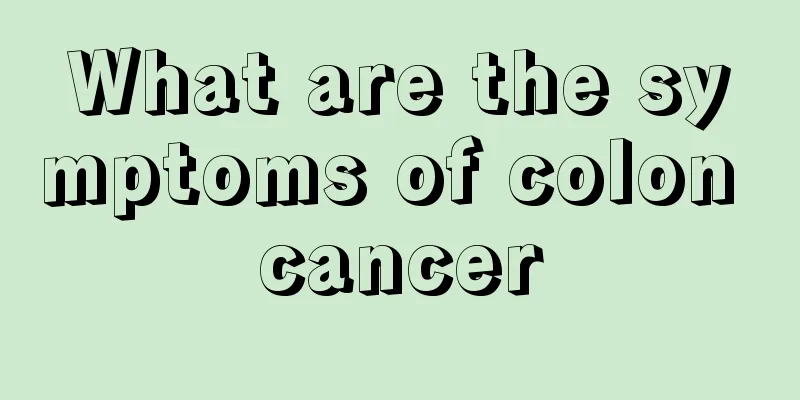What are the symptoms of colon cancer

|
Common symptoms of colon cancer include: 1. Blood in the stool Blood in the stool means bleeding or blood in the stool. If the bleeding is caused by the lesion in the colon close to the anus, sometimes the stool with a jam color or bright red color can be seen with the naked eye. This is overt bleeding. If the bleeding is caused by an intestinal tumor far from the anus, sometimes a laboratory test (i.e. fecal occult blood test) is needed to find out whether there is hidden bleeding in the stool. The patients themselves may not pay much attention to the overt bleeding found by the naked eye and it is very easy to ignore it, especially for patients with existing "hemorrhoids". Most of them are mistaken for hemorrhoid attacks. A domestic hospital once conducted a survey on 312 patients with colon cancer who initially had bleeding as their first symptom. The shortest interval between patients going to the hospital for treatment was 5 months, and the longest interval was 42 months. This lesson was extremely painful. 2. Anemia: Hidden bleeding is sometimes difficult to detect. Due to chronic blood loss, the initial symptoms are characterized by unexplained anemia, which usually does not attract the attention of doctors and patients. It is not until the anemia becomes severe or abdominal mass appears that colon cancer is considered and examination is carried out, but it is too late. 3. Mucus stools Some intestinal tumors can secrete a large amount of mucus, and as the tumor grows, the amount of mucus secretion continues to increase and the frequency of bowel movements increases. 4. Deformed or thinned stools. For tumors located on the side of the anus, as the tumor grows, the stools may gradually become deformed and thinner, the frequency of bowel movements may increase, and there may be a feeling of incomplete bowel movements. As the disease progresses, the tumor may block the intestinal tract and cause obstruction, resulting in difficulty in defecation. 5. When an inappropriate abdominal tumor grows to a considerable size or infiltrates the wall of the intestinal tract, causing intestinal stenosis, the passage of feces in the intestine is blocked. At this time, symptoms such as increased bowel sounds, abdominal distension, abdominal pain, and constipation may occur. Once the above symptoms occur, you should go to the hospital immediately. |
<<: What lifestyles are closely related to the occurrence of colon cancer
>>: How does diet affect the risk of prostate cancer?
Recommend
What is the reason for hot and red face in summer
There are many factors that may cause redness on ...
Are succulents effective in protecting against radiation?
In fact, there are various anti-radiation methods...
Can coffee be added with yogurt
Coffee is a good refreshing drink, and yogurt is ...
Why are my cheeks itchy?
In life, everyone must know that many people'...
What is Mycoplasma pneumoniae infection?
Mycoplasma pneumoniae infection is generally a co...
A new method for diagnosing fibroids
The diagnostic steps and methods of fibroids are ...
Ulcerative colitis can lead to intestinal perforation and colon cancer
Ulcerative colitis can lead to intestinal perfora...
Listening to music can cultivate your sentiment and treat sub-health, killing two birds with one stone
The healing and health-preserving effects of musi...
Prenatal preparation item list autumn
Although the weather is not very hot in autumn, a...
Laryngeal cancer patients can eat more kelp to inhibit tumor growth
A reasonable diet is very important for laryngeal...
Eight first aid methods for common minor injuries in the home
1. Nose bleeding Do it now: Lean forward slightly...
Is it possible for lung cancer patients with pleural effusion to survive for 7 months?
The survival period of patients with metastatic p...
What medicine to take for endometrial cancer
In clinical medicine, endometrial cancer generall...
Can sweet wine eggs be eaten on an empty stomach? What is the nutritional value?
When it comes to sweet wine eggs, girls will defi...
Brief analysis of common symptoms of female uterine cancer
The proportion of uterine cancer patients among f...









